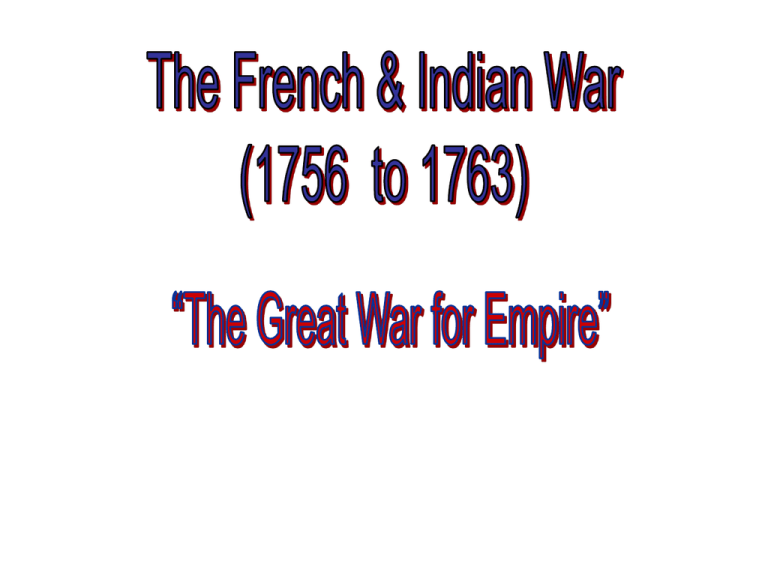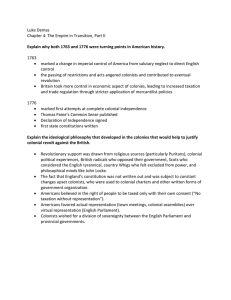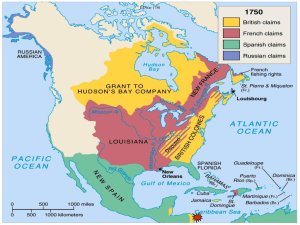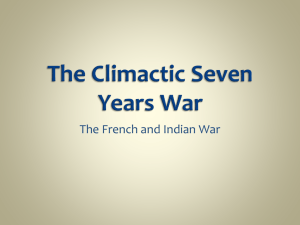apush ch 6
advertisement

French Foothold in Canada • Like England, France was late in coming to New World • 1608: Colony established at Quebec by Samuel de Champlain • Establish the fur trade----beaver pelts • Friendly relations with Hurons • French joined Hurons in battle against Iroquois confederation, who in future hampered French settlement/allies of British • Government of New France under direct control of king, no democracy •French were not here to take over the land and colonize as were the British. •They set trading posts for the fur trade and developed working relationships with the Indian tribes unlike the British. Clash of Empires • 1688-1763: 4 world wars with England, France, Spain, all involving American colonists • 1st two wars: King William’s War and Queen Anne’s War: French, Indians, later Spain vs. England (colonials, no reg. troops on either side) Clash of Empires • 1713: Treaty of Utrecht showed English victory – England given Nova Scotia, Newfoundland, Hudson Bay • Generation of peace followed, more salutary neglect • 1739: War of Jenkins’s Ear, England vs. Spain – Fought in Caribbean, Georgia Clash of Empires • Merged into larger King George’s War (Austrian Succession) – France allied with Spain • New England colonials capture Louisbourg fort • 1748: Peace treaty gives Louisbourg back to French – Colonials mad at Old World diplomats •1754: Albany Congress – convened by British, led by Franklin ~ 1st attempt at colonial unity ~ only 7 of 13 colonies there •Purpose: keep Iroquois loyal, bolster defense against France through colonial unity •Franklin sponsored plan for colonial home rule, unanimously adopted by delegates •Colonies rejected: not enough independence •London rejected: too much independence F/I War 1750 English-French rivalry worldwide would erupt into a world war. FRENCH AND INDIAN WAR OR SEVEN YEARS OF WAR War begins over land disputes in the Ohio Valley British want part of fur trade and the 2 openings into North America FOUGHT FOR THE CONTROL OF NORTH AMERICA England and the 13 Colonies fight together to defend their empire. Against the French, Indian allies and Spanish George Washington starts this war •Ohio Valley river systems important to England and France…. •Both countries claimed these areas which were disputed…. •Both countries built forts to defend their land claims…. 1754 The First Clash The Ohio Valley British Fort Necessity * George Washington French Fort Duquesne * Delaware & Shawnee Indians 1755 Br. Decides to Eliminate Fr. Presence in No. Amer. Gen. Edward Braddock evict the French from the OH Valley & Canada (Newfoundland & Nova Scotia) A Attacks OH Valley, Mohawk Valley, & Acadia. A Killed 10 mi. from Ft. Duquesne by 1500 French and Indian forces. Only Br. Success expelled France from Louisiana. CAJUNS •British concerned about French forts in Virginia territory. •Send Washington, a major in the Virginia militia, to the Allegheny River Valley. •Washington leads 300 men against the French at Fort Duquesne and kills over a 100 French. •Along the way, Washington builds Fort Necessity. The fort falls to the French in a skirmish that will lead to the French and Indian War. •A British statesman later wrote about Washington’s first skirmish: “The volley fired by a young Virginian in the backwoods of America set the world on fire.” 1756 War Is Formally Declared! Lord Loudouin Marquis de Montcalm Native American tribes exploited both sides! Seven Years of War British-American Colonial Tensions Colonials Methods of Fighting: British • Indian-style guerilla • March in formation tactics. or bayonet charge. Military • Col. militias served • Br. officers wanted Organization: under own captains. to control colonials. Military Discipline: • No mil. deference or • Drills & tough protocols observed. discipline. Finances: • Resistance to rising • Colonists should pay for own defense. taxes. Demeanor: • Casual, non-professionals. • Prima Donna Br. officers with servants & tea settings. 1757 William Pitt Becomes Foreign Minister A He understood colonial concerns. A He offered them a compromise: - col. loyalty & mil. cooperation-->Br. would reimburse col. assemblies for their costs. - Lord Loudoun would be removed. RESULTS? Colonial morale increased by 1758. French lose war and all land in North America FRENCH AND INDIAN WAR OR SEVEN YEARS OF WAR English inherit vast new land holdings in North America Great Britain accumulates huge war debts FOUGHT FOR THE CONTROL OF NORTH AMERICA Colonists realize British are not invincible seek independence. England sees responsibility to defend empire in North America King George and Parliament tax the Colonies 1763 Treaty of Paris France --> lost her Canadian possessions, most of her empire in India, and claims to lands east of the Mississippi River. Spain --> got all French lands west of the Mississippi River, New Orleans, but lost Florida to England. England --> got all French lands in Canada, exclusive rights to Caribbean slave trade, and commercial dominance in India. Treaty of Paris 1763 •England gains French land from Canada to Florida and Appalachians to the Mississippi River. •England gains Florida from Spain. F/I War 1763 Effects of the War on Britain? 1. It increased her colonial empire in the Americas. 2. It greatly enlarged England’s debt. 3. Britain’s contempt for the colonials created bitter feelings. Therefore, England felt that a major reorganization of her American Empire was necessary! Effects of the War on the American Colonials 1. It united them against a common enemy for the first time. 2. It created a socializing experience for all the colonials who participated. 3. It created bitter feelings towards the British that would only intensify. Indian Attacks force British to build forts to protect settlers moving westward Northwest Territory Pontiac •Chief Pontiac was an influential Ottawa leader who encouraged his people not to make peace with white settlers. •He was murdered by those who opposed his political views. •Colonists moved into this new territory causing Indian attacks on their settlements. •Great Britain would prohibit the Colonists from moving westward. Troops1 •British Troop Movements in response to Chief Pontiac’s resistance to negotiate. BACKLASH! British Proclamation Line of 1763. Colonials Paxton Boys (PA) Pass a series of tax laws and have the Colonists help pay back the debt. Pass a law restricting Colonists from moving westward into and settling the Northwest Territory. Keep British troops in North America to stop Indian attacks and protect the Colonies. Stop the smuggling of Colonials by enforcing the Navigation Acts with a series of unrestricted search warrants. Northwest Territory British land policy to temporarily keep the colonists out of Indian land until treaties could be negotiated with the tribes. •Colonial pioneers such as Daniel Boone, defied the Proclamation of 1763 and crossed the Appalachians and settled areas in what would become Kentucky. •The belief that the land westward was sacred land, fought and died for and that it was their birthright….It belonged to them. •The “American Dream” could be found out west led many colonists to defy the Proclamation of 1763 and cross the Appalachians. Tax w/out rep Virtual Representation Actual Representation • Americans resented “virtual” representation. • Colonists governed themselves since the early settlers. • It did not matter if the Colonists did not elect • They had direct representation by electing members from each colony colonial assembly to represent them in the members to represent their British Parliament. interests. • Not all citizens in Britain • Colonists were not were represented either. opposed to paying taxes because the Colonies taxed • The British Parliament their citizens. pledged to represent every • If the British Parliament was to person in Britain and the tax them, they should be able to empire • The 13 Colonies were represented under the principle of “virtual” representation. elect a representative from their colony to represent their Theories of Representation Q-> What was the extent of Parliament’s authority over the colonies?? Absolute? OR Limited? Q-> How could the colonies give or withhold consent for parliamentary legislation when they did not have representation in that body?? The Power to Tax is the Power to Destroy If you have the power to tax, you have the power to take all their wealth from them. If there is no check upon the people who posses the “power to tax” then they have the power to destroy. Colonists wanted an “actual” representative elected from them to address their concerns to Parliament. The Power to Tax is the Power to Destroy If a politician wants to have power he needs votes of the people that elect him. He has to live among those people so he will not use his power to destroy them, Or, the people may in turn vote him out of power or worse destroy him. Man’s nature is greedy. Therefore, he cannot be trusted with unchecked power. Absolute power corrupts, absolutely. Restless Colonials • Colonials: higher confidence in military ability, but contempt from British (Washington demoted) • British concerned by disloyalty of American shippers in war • Many colonies refused to provide money or troops for war • Colonists wanted rights of Englishmen, but not responsibilities. • Inter-colonial disunity had continued through war (distance, religion, ethnicity, class), but participants in war had found commonality People of Destiny • French presence had forced colonists to stay close to British, no more • Spanish threat lessened (FL) • Indian threat lessened: Iroquois and Creeks hurt by Treaty of Paris, could not play powers off each other People of Destiny • Americans felt betrayed, defied Proclamation, bad sign for future of royal power • War gave colonials sense of destiny to conquer continent • War gave British confidence, heavy hand toward colonies • Stage set for conflict







